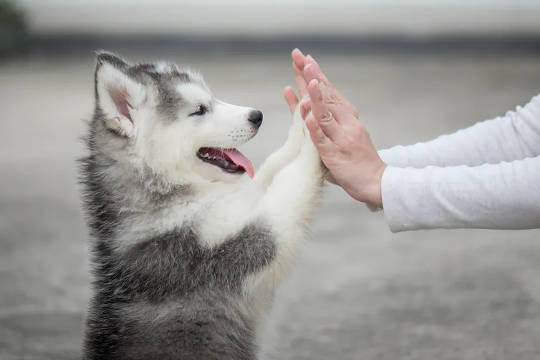
Key to the success of a long-term dog-owner relationship is building a good foundation. www.shutterstock.com
Puppies have the potential to bring enormous benefits to their owners’ lives and can be an asset during uncertain times, including lockdown. That said, caring for a young animal is not without its challenges. With more than one in four puppy buyers during the pandemic admitting it was an impulse decision, there are genuine concerns for the future of the animals taken on during this time.
The success of a long-term dog-owner relationship depends on building a good foundation. Here are six things every owner needs to know about looking after a puppy and developing a long-lasting relationship with their new best friend.
Exercise
While many new owners romanticise the idea of taking long walks with a frolicking puppy, the reality is young dogs, especially larger breeds, should not be allowed too much exercise. Puppies have a lot of energy, but their bones, joints and growth plates are soft and can be easily damaged.
Too much exercise is almost as harmful as not enough. Over-activity at the wrong age leads to health problems including hip dysplasia, growth deformation and movement disorders.
Get The Latest By Email
There is no exact science on the optimum amount of time puppies should be walked for. However, a general rule of thumb is five minutes per month of age, twice a day. By this logic, a 16-week-old puppy would need a daily total of only 40 minutes exercise.
Vaccinations
Vaccinating your puppy is one of the most important things to be done in the first few weeks as a new owner. Vaccinations can protect dogs from a wide variety of potentially dangerous pathogens including parvovirus, kennel cough, hepatitis and leptospirosis.
Puppies typically receive their first set of vaccinations around eight to 10 weeks of age, with another set two to three weeks later, although protocols vary. Puppies are not advised to come into contact with un-vaccinated dogs until they are fully protected, so walks in the park are off limits. However, pups can still be carried around the neighbourhood to facilitate socialisation.

Puppies need to be socialised when they are just a few weeks old. from www.shutterstock.com
Socialisation
Dogs have a number of important stages of development, one being the socialisation period, thought to lie between three and 16 weeks of age. Within this relatively short window of opportunity, puppies need to be exposed to as many different people, animals and situations as possible.
Failure to socialise your puppy can result in a strong fear of these stimuli later in life and, in some cases, the development of resistant behaviour problems. Dogs that are denied contact with children may become overly reactive in their presence, lunging towards them and even attempting to bite.
The importance of putting effort into exposing puppies to the sights, sounds and smells of as many different stimuli and situations as possible cannot be overemphasized. Doing so will allow your dog to navigate life more easily.
Separation
Lockdown has resulted in a dramatic increase in the amount of time owners spend with their pets, which could lead to an increase in canine separation anxiety when owners return to work. This problem is believed to stem from an over-attachment between the animal and its caregiver, and one that frequently results in animals being rehomed.
Typical symptoms of this anxiety disorder include urinating or defecating indoors, barking and whining, destruction of the home, escape attempts or self-mutilation whenever the pet is left alone. Separation anxiety is difficult to treat successfully.
It is important to put effort into preventing over-attachment from an early stage, by gradually increasing the length of time the animal spends alone. Various enrichment tools can help the puppy feel relaxed during these periods of separation. Things like pheromone diffusers, classical music or odourants are renowned for their relaxing properties.
Dangerous foods
While it can be tempting to give your puppy leftovers from the table, there is a long list of foods that can be toxic to dogs. For example, chocolate, especially the dark variety, contains the stimulant theobromine. If ingested, this can damage dogs’ guts, heart, central nervous system or kidneys, leading to vomiting, diarrhoea, hyperactivity, seizures, and even death.
Onions, garlic and chives, in all forms, can cause damage to dogs’ red blood cells, eventually leading to anaemia. Xylitol, an artificial sweetener found in foods like sugar free chewing gum, some peanut butters and some sweets, can cause dramatic drops in blood sugar, and, in some cases, liver failure.
The list of other foods that are dangerous to dogs is quite extensive, including, among others, caffeine, alcohol, grapes and raisins. Owners should familiarise themselves with the list of foods that are harmful to dogs and seek immediate veterinary advice in the event of ingestion.
Poisonous plants
Puppies are notorious for eating anything and everything. Many seem to regard the garden as their own personal larder. Unfortunately, there are numerous botanical hazards that owners need to be aware of.
Certain bulbs, like daffodils, and house plants like poinsettias should be avoided. Seeds and foliage like acorns, ivy and mistletoe can all have a life-threatening impact on dogs. Early signs of toxicosis can include vomiting, diarrhoea and salivation, with more serious effects, such as liver and kidney damage, taking up to two days to manifest themselves. Again, veterinary care must be sought immediately if an owner suspects their puppy has eaten any potentially poisonous plant material.
Being aware of these important tips will help keep your puppy healthy and happy, bringing you a lifetime of joy. Getting a puppy is extremely exciting, but just a little bit of thought and planning will make sure you and your pup get off to the best start possible.
About the Author
Deborah Wells, Reader, School of Psychology, Queen's University Belfast
This article is republished from The Conversation under a Creative Commons license. Read the original article.
books_pets







